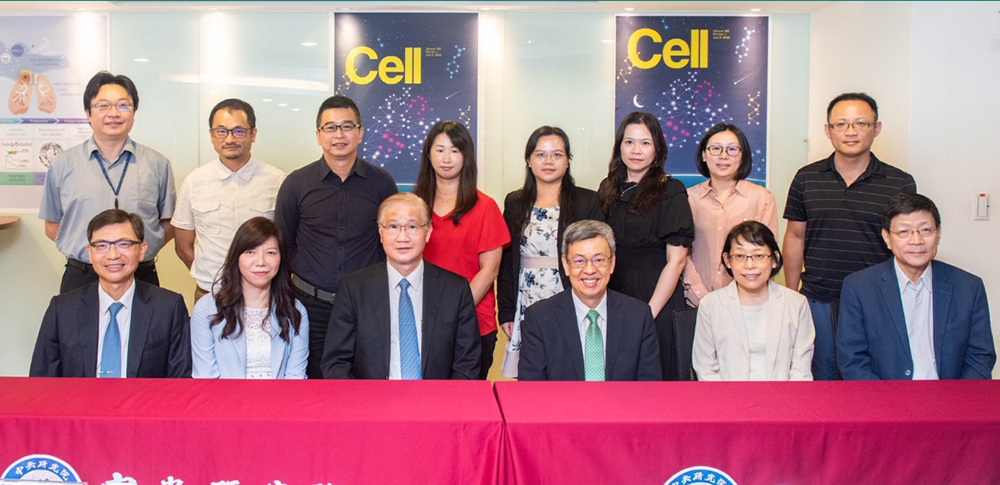深度蛋白基因體大數據:解析未吸菸肺癌的可能致病機轉
Proteogenomics of Non-smoking Lung Cancer in East Asia Delineates Molecular Signatures of Pathogenesis and Progression

Two new studies released July 9th, 2020 in Cell unravel the biology of lung adenocarcinoma (LUAD) using a suite of molecular techniques that, combined, provide a more complete picture of the disease than ever before. Using a diverse cohort of smokers and non-smokers, male and female, from around the world, researchers from the Clinical Proteomic Tumor Analysis Consortium (CPTAC) and the International Cancer Proteogenome Consortium (ICPC) draw out a clearer understanding of LUAD tumor progression, identify biomarkers, and propose alternative therapeutic targets.
Lung cancer is the most commonly diagnosed cancer worldwide and the leading cause (link is external) of cancer-related deaths in both men and women in the United States. Despite the advent of improved drug therapies, the 5-year survival rate still remains below 20% because symptoms rarely show up until the cancer has spread to other parts of the body, making it extremely difficult to treat.
Advances in genomics have revealed new insights in the biology of LUAD, but comprehensive information about how various gene mutations lead to this disease is still lacking. CPTAC and ICPC investigators addressed this challenge by adding comprehensive proteomics to genomics, or proteogenomics, to reveal an additional dimension of lung cancer biology.
Molecular Signatures of Pathogenesis and Progression in East Asia
Although strongly associated with smoking, significant populations of never-smokers also develop lung cancer. While never-smokers account for approximately 20%(link is external) of lung cancer patients in the United States, in Taiwan more than 50% of patients are never-smokers, and many with early onset of the disease. The high number of East Asian LUAD never-smokers presented an opportunity for the ICPC-Taiwan team, led by Drs. Yu-Ju Chen and Pan-Chyr Yang with colleagues from Academia Sinica(link is external), National Taiwan University(link is external), Taipei Medical University(link is external), Taiwan and The Institute of Cancer Research(link is external), UK, to take a closer look(link is external) at the mechanisms of this disease in 103 East Asian patients with a focus on early stage.Comparison of tumor/normal matched tissue pairs revealed strong associations between APOBEC mutagenesis and carcinogenesis. The APOBEC family of RNA-editing enzymes function to make specific changes to transcripts and allow a single protein to operate differently in different organs. In 74% of the younger female never-smokers (<60 years old) and all female patients without EGFR driver mutations in this study, researchers found high APOBEC mutational signatures, accompanied by high expression of APOBEC family enzymes and DNA repair/replication pathways upon combining proteomic and phosphoproteomic profiles. In addition, a correlation between high APOBEC signature and good response to immunotherapy was observed, making it a potential marker candidate for early stage diagnosis and immunotherapy treatment. However, in older females (>70 years old), mutagenesis derived from exposure of environmental carcinogens were found to be the prominent cancer drivers at early stages. Furthermore, proteomics showed additional evidences in the activated signaling in the metabolism and detoxification of chemical carcinogens, and pathways potentially causing tumor initiation, malignant progression and immune modulation in early carcinogenesis, suggesting that reducing carcinogen exposure from air pollutants and food preservatives maybe an effective strategy to improve lung cancer prevention.
Furthermore, proteomic characterization of the cohort stratified patients into five distinct subtypes, revealing a novel ‘late-like’ subtype (Stage 1B ‘late-like’) in patients with EGFR L858R mutations that display aggressive clinical features. Taiwanese patients have previously been shown to have a demographically distinct cancer genome mainly driven by two EGFR mutations: Del19 and L858R, the latter being associated with shorter survival outcomes and higher tendencies to develop malignant pleural effusion and metastasis without a clear mechanism. This study shows a molecular distinction between tumors with EGFR Del19 and L858R genetic mutations. These new findings suggest an early point of divergence in tumor phenotype where clinicians could identify high-risk patients to receive closer monitoring and possible adjuvant therapy. Early stage ‘late-like’ tumors also showed significant increases in MMP11, an enzyme that cuts away at the surrounding tissue, that may also serve as a strong early stage biomarker candidate.
“Proteogenomics helped identify demographically distinct signatures of oncogenesis and progression in never-smokers,” Dr. Yang said. “This approach has provided new insights on the management of early stage never-smokers with LUAD.”
Both these studies, CPTAC and ICPC, layer comprehensive multi-omic analysis to uncover findings that would otherwise remain disconnected. The discovery of new lung tumor biology and a continuous look at early stage LUAD development provides a significant boost to help develop strategies for detection and management.
“The collective findings of these studies are a result of using proteogenomics in research to produce an additional dimension to cancer biology and organizations working together to take on cancer, with a focus on patients as cancer knows no borders,” said Dr. Henry Rodriguez, Director of NCI’s Office of Cancer Clinical Proteomics Research.
These studies are a part of a series of studies supported by the National Cancer Institute’s (NCI’s) CPTAC and ICPC programs to fight cancer using proteogenomics and precision oncology. Previously published papers from these programs have focused on endometrial, kidney, breast, ovarian and colon cancers. Both studies have produced proteogenomic datasets that are available as a unique public resource for researchers and clinicians seeking to better understand and treat lung cancer.
Media Contact:
Dr. Yu-Ju Chen, Distinguished Research Fellow/ Acting Director, Institute of Chemistry, Academia Sinica
(Tel) +886-2-5572-8660, yujuchen@gate.sinica.edu.tw
Mr. Chung-Hui Chuang, Secretariat Office, Central Office of Administration, Academia Sinica
(Tel) +886-2-2789-8820, chchuang@gate.sinica.edu.tw
Mr. Chang-Hung Chen, Secretariat Office, Central Office of Administration, Academia Sinica
(Tel) +886-2-2789-8059, changhung@gate.sinica.edu.tw
肺癌傳統被認為與吸菸畫上等號,不過,臺灣的不吸菸肺癌患者卻比吸菸者多。中央研究院化學研究所陳玉如所長、中研院楊泮池院士與跨單位研究團隊以蛋白基因體技術建立臺灣早期肺癌病人的多體學大數據,找到不吸菸肺癌患者可能的致病機制。研究主要有三個發現,首先是肺癌和人體體內APOBEC突變特徵的高低、其次與致癌物的曝露有關;最後更發現一個從未被發現的新亞型肺癌,及其致癌基因突變的差異,有助早期發現臨床潛在的高風險肺癌患者。
研究主持人陳玉如表示,「這是東亞第一套結合深度多體學大數據及完整臨床資料,深度解析不吸菸肺癌成因的研究成果」,也是美國臨床蛋白基因體學腫瘤分析聯盟(CPTAC)首次和國際聯盟團隊(臺灣)攜手合作,以蛋白基因體學揭開臺灣及美國病人肺癌生物學的面紗。臺美二個獨立成果於今(2020)年7月9日同步發表在國際頂尖期刊《細胞》《Cell》上,並共同榮登本期雜誌封面。
肺癌致病的關鍵: APOBEC 突變特徵、致癌物效應
肺癌是全球癌症死亡的主因,即使藥物治療近年有長足的進展,5年存活率仍低於20%,目前仍是國人癌症死亡頭號殺手。研究指出,在美國不吸菸者約佔肺癌患者的20%,而東亞地區(包括臺灣)的肺腺癌有獨特的特色,不吸菸者(尤其是女性)患病的比率高過於吸菸者。在臺灣有50%以上的肺癌病患並不吸菸,超過9成得肺癌的女性都不抽菸,而且近十年有年輕化的趨勢。為釐清東亞不吸菸肺癌的致病機制,此研究分析東亞地區103名肺癌病患,探究早期不吸菸肺癌的發病與進展。
癌細胞基因突變結果顯示,東西方病人突變的基因背景大為不同;肺腺癌癌變與APOBEC的突變特徵很有關。罹癌患者中,高達74%從未吸菸年輕女性(小於60歲)和所有無肺癌「表皮生長因子受體(EGFR)」驅動突變的女性患者APOBEC突變特徵程度高,顯示APOBEC的突變特徵可能為女性早期肺癌的驅動因素;而高APOBEC突變特徵又與免疫療法療效呈正相關。因此,APOBEC突變特徵可能成為早期診斷和免疫治療的潛在生物標誌物。
此外,研究也發現,暴露於致癌物而引起的基因體編輯突變特徵,亦可能是癌症早期的主要驅動因素。在部分較年長女性(大於70歲)中程度較高,化學致癌物代謝和解毒過程及特定途徑的活化可能影響腫瘤癌化、惡化和免疫調節異常。換言之,減少生活中致癌物的暴露率可能是預防肺癌的有效策略。
發現「新亞型」肺癌有助早期發現潛在高風險患者
過去研究已知,臺灣肺癌患者主要在EGFR基因上會發生Del19和L858R兩種突變,病患若是發生L858R突變,存活率較低,且容易產生惡性胸腔積液和癌細胞轉移,不過至今仍未發現明確的生物機轉。此次透過蛋白體學特徵可將肺腺癌分為五個亞型,其中有一個從未被發現的新型早期肺癌「類晚期」亞型。此亞型可區分出Del19和L858R突變的腫瘤在早期癌症之惡性特徵。因此,臨床醫師有機會可藉惡性特徵發現早期肺癌患者,進一步提供密集的監測和考慮可能的佐劑加以治療。此外,「類晚期」亞型的早期腫瘤也可發現顯著增加的蛋白,如間質溶解素MMP11等,可能可以作為檢測的生物標誌。
東亞第一個解析不抽菸肺腺癌之多體學大數據
工欲善其事,必先利其器,有賴於深度蛋白質基因體技術和多體學數據整合分析,及臺灣肺癌臨床團隊提供高品質檢體及臨床資料分析,此次跨領域及院校研究方能就東亞肺癌有此重大突破。肺癌團隊主持人楊泮池院士指出,「蛋白基因體學發現不吸菸肺癌患者在腫瘤發生和癌症進程上存在著人種和地域上的獨特性,此研究為早期不吸菸者肺腺癌提供了新的見解」。
除中研院之外,研究團隊成員由臺灣大學、臺北醫學大學、臺中榮總提供病人檢體、臨床數據及檢測技術等,共同呈現前所未有的東亞肺腺癌完整鳥瞰圖景,包括針對男女族群、吸菸與不吸菸族群,描繪出更清晰的肺腺癌疾病進程,並且發現新的癌症標誌物與找出導致臺灣肺腺癌的可能病因。
首次攜手合作臺美「癌症登月計畫」重大發現
本院擁有領先世界的蛋白基因體技術、生物資訊分析平台與大數據分析技術,且臺灣醫療團隊具備完善的長期追蹤資料。藉此優勢,本院與美國國家癌症研究所(National Cancer Institute, NCI)於2016年簽署「癌症登月計畫(Cancer Moonshot)」合作備忘錄,參與國際癌症蛋白基因體學聯盟(International Cancer Proteogenome Consortium, ICPC)。同年10月臺灣通過生醫產業推動方案,科技會報將癌症登月計畫納入為「推動特色重點產業」策略之一,提供利用蛋白基因體大數據開發創新診斷及新藥研發之契機。
持續關注肺腫瘤生物學及早期肺腺癌的研究進展,將有助推動肺癌檢測開發和相關管理策略。「癌症登月計畫」臺灣團隊認為,臨床資訊、多體學技術及體學大數據為發展癌症精準醫學之必要基礎工程,為欲深入研究和發展肺腺癌精準醫療的研究人員和臨床醫生的最大後盾。若能進一步凝聚跨學研單位、醫學中心及跨部會及產學合作,透過與國際癌症登月計畫團隊分享各國數據與資源,持續研發新策略,有助未來發展臺灣特色的精準醫學。
論文共同第一作者為本院化學所陳誼如博士後、本院統計所張雅媗博士後及英國癌症研究所 Theodoros I. Roumeliotis,本院資訊所陳鯨太博士後及時任本院化學所林妙霞博士後 (現任臺灣大學)亦列為共同第二作者。研究團隊包括本院化學所陳玉如所長、本院楊泮池院士、本院統計所陳璿宇副研究員、英國癌症研究所Jyoti S. Choudhary、臺灣大學醫學檢驗暨生物技術學系與基因體暨精準醫學研究中心俞松良教授、臺大醫院外科醫師陳晉興、本院資訊科學研究所宋定懿研究員及臺北醫學大學韓嘉莉助理教授等。本次研究經費主要來自科技部、中研院及臺灣大學支持。
本期期刊封面連結: https://reurl.cc/Qdvqv5
論文全文連結:〈Proteogenomics of Non-smoking Lung Cancer in East Asia Delineates Molecular Signatures of Pathogenesis and Progression〉。網址:https://reurl.cc/626v1y
新聞聯絡人:
陳玉如,中央研究院化學所所長、特聘研究員
(Tel) 02-5572-8660,yujuchen@ gate.sinica.edu.tw
莊崇暉,中央研究院媒體小組
(Tel) 02-2789-8820,chchuang@gate.sinica.edu.tw
陳昶宏,中央研究院媒體小組
(Tel) 02-2789-8059,changhung@gate.sinica.edu.tw
